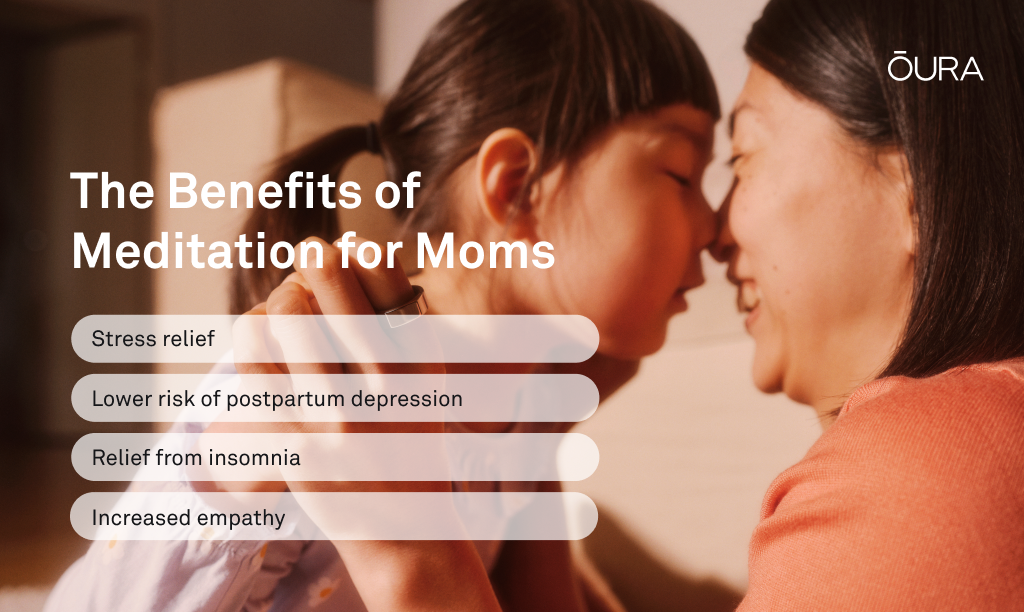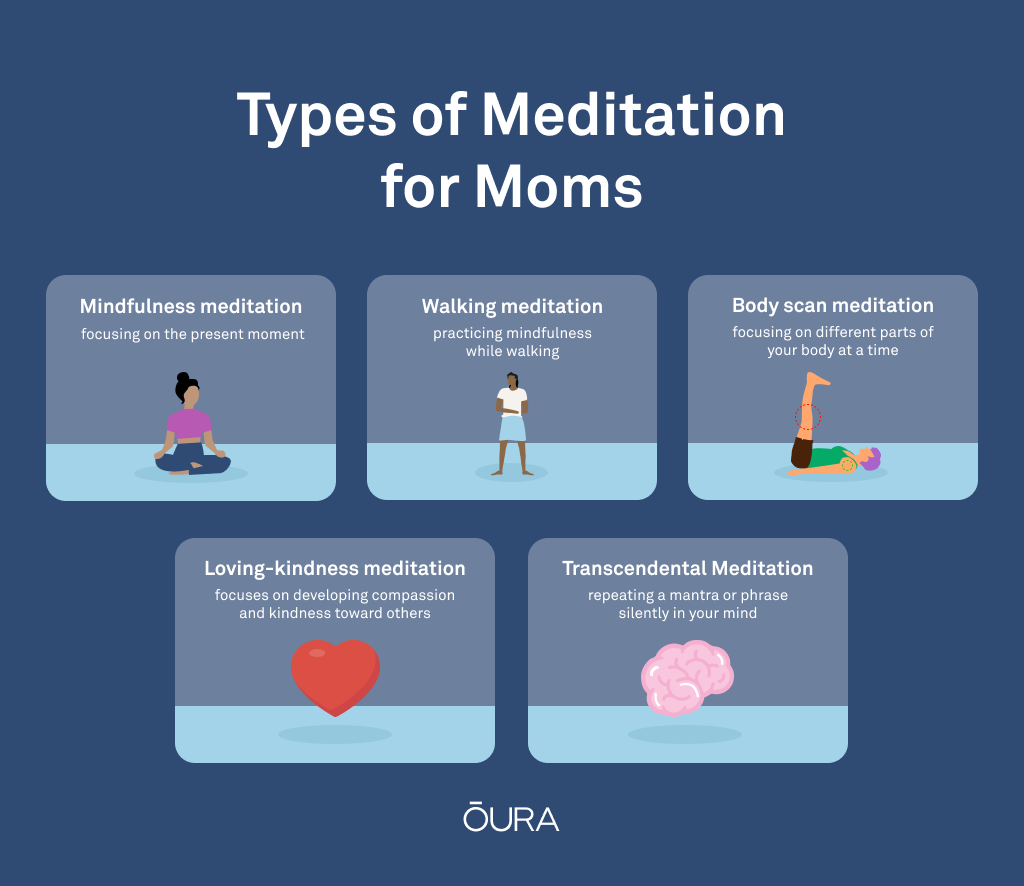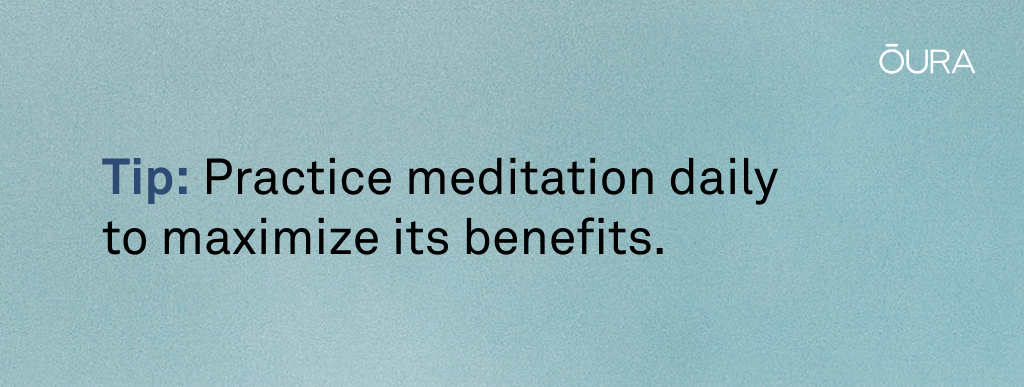Becoming a mother is beautiful, but it’s not without challenges. A 2019 study confirmed what mothers everywhere have always known: Being a mom comes with a big side-helping of sleep deprivation — six years of sleep deprivation, to be precise.
Other research indicates that new mothers are at risk of insomnia, which can cause daytime sleepiness and fatigue. Additionally, sleep deprivation can worsen symptoms of postpartum depression, which affects roughly one in ten women.
Add to this the pressure of being a new mom and the anxiety over doing it “right,” and it’s no wonder busy moms are losing sleep. There’s no magic bullet for dealing with the stresses of motherhood. However, carving out time for self-care and relaxing activities like meditation can help you unwind and get a decent night’s sleep — as long as your baby lets you.
READ MORE: Can Meditation Help You Sleep?
If you’re an Oura member, you can access over 70 guided meditations through the Explore Tab in your Oura App. Otherwise, scroll down for a selection of our best meditation audios for moms. These are suitable for both beginners and experienced meditators.
RELATED: Try Oura’s Guided Meditations for Deep Sleep
Benefits of Meditation for Mothers

Below are just a few of the ways a regular meditation practice can help moms feel calmer, bond with their babies, and get more quality sleep.
You’ll Feel Less Stressed
Daily life can be pretty darn stressful for moms who, according to research, spend more time juggling work and family responsibilities than fathers do. The result? Stressed-out, frazzled moms who could really use some quality shuteye.
Plus, new mothers are particularly vulnerable to stress because of the significant physiological changes they’re undergoing, such as weight gain and loss, fluctuating hormone levels, and sleep deprivation. Meditation and mindfulness can be effective at relieving stress and helping moms calm down so they can finally get some rest.
One way to keep track of your stress levels is to monitor your heart rate variability (HRV). During times of stress, your HRV is lower, and when you’re relaxed, it’s higher. Use your Oura Ring to keep track of your HRV and log your meditation practice using the Tags feature so you can see its effectiveness over time.
READ MORE: Oura Empowered Me to Care for Myself During Pregnancy
You May Have a Lower Risk of Postpartum Depression
Meditation for mothers has been proven to support mental health in a variety of ways, and research shows that practicing it during early pregnancy can help women manage their stress as they transition into motherhood. When done right, meditation can even reduce the risk of postpartum depression.
It Can Help You Find Relief from Insomnia
Mindfulness meditation has been found to alleviate insomnia and improve sleep quality among people with sleep disturbances.
You’ll Be a More Empathetic Parent
Research has shown that mothers with higher levels of empathy are more sensitive to their children’s needs and more capable of creating “an intimate, multi-responsive atmosphere” while caring for their infants.
Meanwhile, another study found that practicing loving-kindness meditation and compassion meditation increased empathy among participants — so it could be a useful tool for moms who wish to practice empathetic, mindful parenting.
5 Meditations for Mothers (Plus Free Audios)

There are many types of meditation available, so we suggest trying them out to find what works best for you. Here are five different types of meditation that can help you relax and get a good night’s sleep.
Mindfulness Meditation
This type of meditation involves focusing your attention on the present moment using a focal point, such as your breath. Developing your mindfulness skills through meditation can help you stay calm and centered — even when your child is throwing a tantrum in the middle of a parking lot.
A common misconception about mindfulness meditation is that the goal is to stop thinking, but that’s actually impossible. Your mind is constantly generating thoughts because that’s what it’s designed to do — just as your heart constantly pumps blood.
Rather, mindfulness is about choosing where you focus your attention — you can decide to let your brain follow that random thought about a time you did something embarrassing or choose to focus on the present moment.
Walking Meditation
Walking meditation is a form of mindfulness meditation that you practice while walking. As with mindfulness meditation, it’s about focusing on the present moment.
This type of meditation involves walking slowly and paying attention to your footsteps, the sensations in your body, and the world around you. It can be a good option if you find it difficult to sit still for long periods of time.
Body Scan Meditation
As the name suggests, this type of meditation involves focusing on different parts of your body one at a time to release any tension or stress. It can be helpful if you carry a lot of physical tension.
Loving-Kindness Meditation
This type of meditation helps you build feelings of kindness and compassion toward yourself and others. It also strengthens the bond between you and your child.
Guided Loving-Kindness Meditation
Transcendental Meditation
Transcendental Meditation entails focusing on a mantra or phrase by repeating it in your mind. The mantra or phrase acts as the object of focus. This is similar to the way breathing is the focus of mindfulness meditation.
The deep relaxation gained from practicing Transcendental Meditation can relieve stress and help you maintain a healthy emotional balance.
Transcendental Meditation Mantra for Grounding
Make Meditation Part of Your Postpartum Self-Care Routine

Meditation for mothers is a wonderful tool that can help new moms transition into their new roles. More experienced mothers can use it to better manage the highs and lows of parenthood.
When you listen to a meditation in the Oura App’s Explore Tab, you’ll be able to choose a background soundscape to accompany your meditation. You’ll also see immediate biofeedback after the meditation session, which can include your heart rate variability (HRV), resting heart rate (RHR), and skin temperature variation.
This will help you notice a particular meditation calms you more than others. Add that to your bedtime routine. Plus, you can track your Sleep Score over time to see whether the quality of your sleep improves as you implement new habits.
RELATED: The 10 Most Effective Coffee Alternatives for Pregnancy





